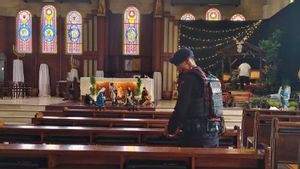JAKARTA - The act of forcibly repatriating the bodies of patients under surveillance (PDP) of COVID-19 by hundreds of residents in a hospital in the city of Makassar, South Sulawesi, could be convicted. Because, that action violates the rules.
The incident occurred on Sunday, June 7. Hundreds of residents flocked to Stella Maris Hospital. They forced to repatriate the body of a 53 year old woman who is PDP COVID-19.
The residents' action forced the Ujung Pandang Police to intervene. This is because the number of people involved is quite large and it is feared that it could provoke a big riot.
An observer of criminal law at Al Azhar University, Suparji Ahmad, said that the actions of residents could indeed be subject to criminal charges. They are suspected of violating Article 216 of the Criminal Code because they did not obey orders carried out according to law.
"They can be charged with criminal charges. In fact, they are usually charged under Articles 212, 214, or 216 of the Criminal Code," Suparji told VOI, Tuesday, June 9.
Referring to Article 216 of the Criminal Code, this rule contains the question of whoever deliberately does not comply with orders or requests made according to law by an official whose job is to supervise something, or by an official based on his duties, as well as those who are given the power to investigate or investigate a criminal act; Likewise, anyone who deliberately prevents, obstructs or thwarts actions to enforce the provisions of the law by one of these officials, shall be punished by a maximum imprisonment of four months and two weeks or a maximum fine of Rp9,000,000.
Apart from that, the act of forced repatriation, said Suparji, could have happened for two reasons. First, because they consider the funeral or corpse to be a private matter for the family. Second, residents considered that the patient's death was not caused by COVID-19. So that they do not accept and decide to take this action.
"Yes, it can be because you think it is a family matter or do not think that the person who died has the corona so that the family does not consider it dangerous," said Suparji.
On the side of actionHead of Public Relations of the South Sulawesi Regional Police, Kombes Ibrahim Tompo, said that his party would take action against and process the violation of the law. Later, the suspected article, namely, Article 93 of law number 6 of 2018 concerning junto health quarantine Article 214 of the Criminal Code.
Article 93 of law number 6 of 2018 contains about every person who does not comply with the implementation of Health Quarantine as referred to in Article 9 paragraph (1) and / or obstructs the implementation of Health Quarantine so as to cause a Public Health Emergency to be sentenced to imprisonment of 1 year. and / or a maximum fine of Rp. 100 million.
"With the two suspected articles, later those who are proven to be involved can be threatened with 7 years in prison," said Tompo.
For this reason, continued Tompo, the public was asked to understand more about the procedures in the process of covering the Covid-19 body. Because, the purpose of these rules is to avoid transmission and spread.
If you still choose to bury with procedures that can be carried out without the presence of COVID, then it is likely that the transmission will become even more massive and difficult to control.
"Public understanding of the spread of covid can have an impact on spreading it to other communities. It should also be understood about the procedure (explanation) to protect the community," concluded Tompo.
The English, Chinese, Japanese, Arabic, and French versions are automatically generated by the AI. So there may still be inaccuracies in translating, please always see Indonesian as our main language. (system supported by DigitalSiber.id)













